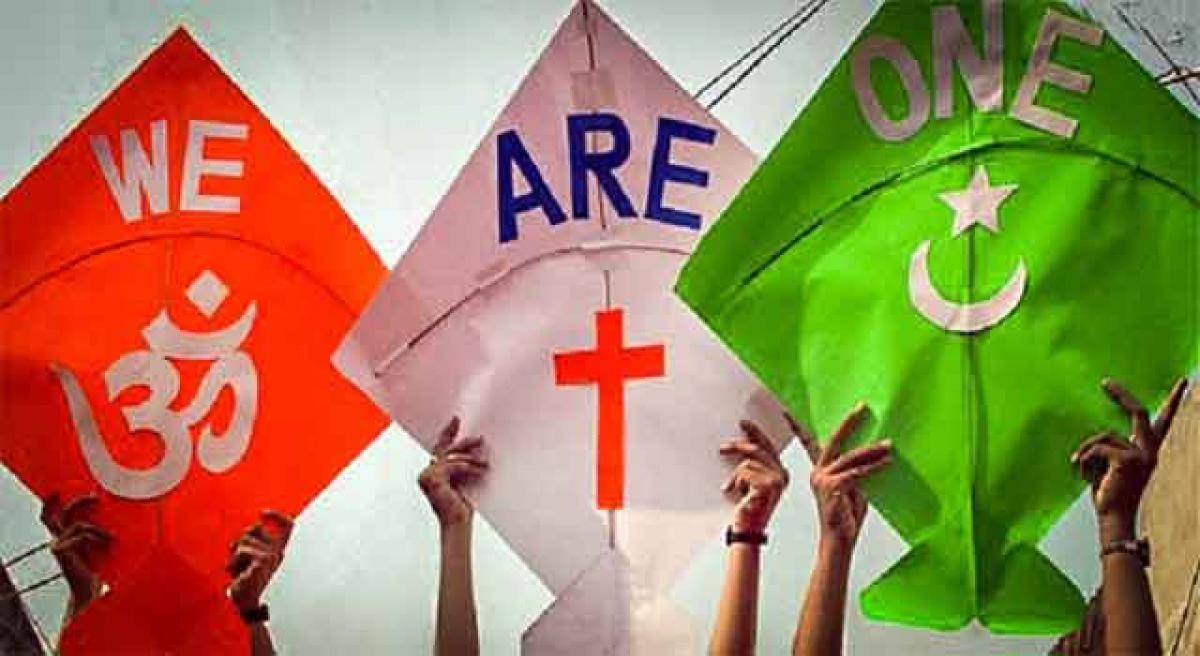Live
- KCR hand in glove with BJP: Revanth
- Kaleshwaram Irregularities: Ghose Commission to dig deep to find flaws
- Kudos to young boy: Saichand’s timely action saves trapped workers
- MyVoice: Views of our readers 27th April 2024
- WHO launches first ever Patient Safety Rights Charter
- Guntur: Narendra Modi to campaign in Andhra Pradesh on May 7,8
- Lower Voter Turnout: ‘400 paar’ looks remote for NDA
- ‘Reduce, Reuse, Recycle’: Mantra for green living
- BJP MP candidate Bharat Prasad visited the student who tried to commit suicide
- PM’s popularity in the fast lane: Autos with 'Har Dil Mein Modi' slogan spotted across Delhi
Just In

In a far-reaching decision likely to start a heated political debate, the Modi government has asked the Law Commission to \"examine\" the issue of implementing the Uniform Civil Code.
New Delhi: In a far-reaching decision likely to start a heated political debate, the Modi government has asked the Law Commission to "examine" the issue of implementing the Uniform Civil Code.
This is the first time a government has asked the commission, which has a crucial advisory role on legal reform, to look into the politically controversial issue of the Uniform Civil Code.
HIGHLIGHTS :
- Law panel told to ‘examine’ its implementation
- Move likely to trigger heated political debate
The Uniform Civil Code will mean a set of common personal laws for all citizens. Currently, for example, there are different personal laws for Hindus and Muslims. Personal law covers property, marriage and divorce, inheritance and succession.
The political debate on the Uniform Civil Code has been highly charged, and it is often entwined with a debate on secularism. Those for and against such a code offer differing interpretations of the social and religious impact of a Uniform Civil Code.
While, the Bharatiya Janata Party has always been in favour of such a code, the Congress has always opposed it. And Hindu and Muslim groups are on opposite sides of the debate.
Officials say that the Law ministry has written to the Law Commission and sought a detailed report on the subject. The letter asks the Law Commission to "examine the matter in relation to the Uniform Civil Code and submit a report".
The ministry has also sent documents relating to existing case law and discussions on case law relating to the Uniform Civil Code.
The Law Commission, currently headed by retired Supreme Court Justice Balbir Singh Chauhan, will submit its report after discussions with experts and stakeholders, officials said.
Article 44 of the Directive Principles, enshrined in the Constitution, sets implementation of uniform civil code as the "duty of the State".
The Uniform Civil Code became a flashpoint in Indian politics in 1985 during the Shah Bano case. The Supreme Court had held that Bano, a Muslim woman, should get alimony from her former spouse.
In the context of that judgement, the court had said the Uniform Civil Code should apply for personal law. The Rajiv Gandhi government had controversially piloted a law in Parliament to overturn the Supreme Court ruling.
Very recently, Union Law Minister DV Sadananda Gowda said that "as far as national integration is concerned, this (Uniform Civil Code) is one of the aspects that we have to take care of ".
However, Gowda had added the process will "entail time because of so many personal laws across the country. There are so many other customs and rituals, and emotions attached to the issue. Slowly and steadily we need to put it in public domain".
A month ago, Union Parliamentary Affairs Minister M Venkaiah Naidu said that while there was the need for a debate on a "common" civil code in the country, the BJP government at the Centre would not "thrust" it on the people.
"Definitely, there is a need (for a debate on common civil code). The Constitutional framers, they advocated it and they have put in directive principles (of state policy) hoping the country in due course will go for the Uniform Civil Code. I call it as a common civil code. Uniform conveys a different meaning," Naidu said.
What Naidu advocated was important aspects of civil life, such as marriage, divorce, maintenance, inheritance and right to property, should fall under a common code, while ways of worship be left to the individual.
Source: Agencies

© 2024 Hyderabad Media House Limited/The Hans India. All rights reserved. Powered by hocalwire.com







